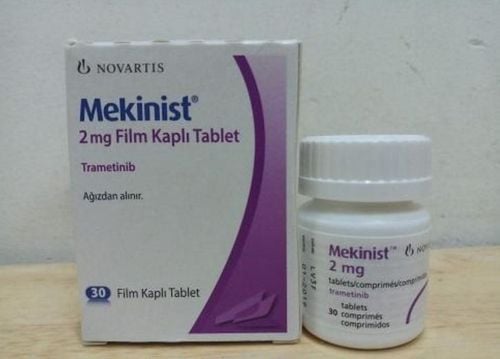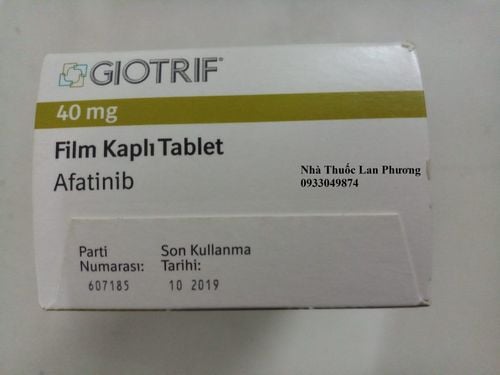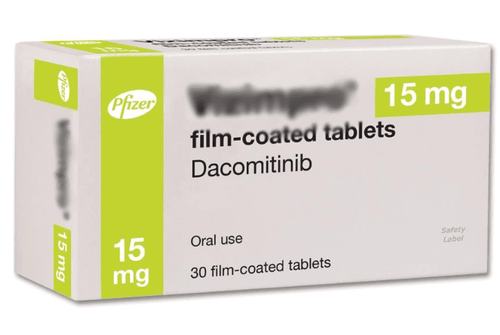This is an automatically translated article.
Small cell lung cancer with mutations in the ALK gene is a special form of the disease that requires treatment with a specific drug, Alectinib. This active ingredient is in the drug Alecensa.
What is Alecensa?
Alecensa medicine contains the active ingredient Alectinib 150mg. This active ingredient belongs to the group of Multikinase inhibitors Alecensa is one of the cancer treatment drugs, affecting the growth and metastasis of cancer cells to other locations in the body. Specifically, Alecensa is used primarily to treat non-small cell lung cancer that has spread to certain other organs of the body. One thing to note is that Alecensa is only indicated for patients with non-small cell lung cancer with mutations in the ALK (Anaplastic Lymphoma Kinase) gene. The doctor will order a test to find the presence of this mutated gene before proceeding to treat the patient.
Some warnings of the drug Alecensa
The cancer drug Alecensa can cause some serious, even life-threatening side effects. Therefore, patients who are taking Alecensa should tell their doctor immediately if they have the following problems:
Cardiovascular problems such as severe dizziness or very slow heart rate; Problems related to lung function such as fever, chest pain, cough, difficulty breathing; Renal dysfunction such as change in urine color, little or no anuria, swelling in the legs; Liver dysfunction such as right upper quadrant pain, dark urine, loss of appetite, jaundice or yellow eyes. Before starting treatment with Alecensa, the patient should inform the doctor about the following issues:
History of allergy to the active ingredient Alectinib; A medical history of lung problems or respiratory dysfunction, in addition to lung cancer; Liver disease; History of bradycardia. Alectinib can harm an unborn baby or cause birth defects if either parent is using Alecensa. Therefore, pregnant women absolutely should not use Alecensa. At the same time, women with ALK-positive small cell lung cancer who are indicated for treatment with Alecensa should use safe and effective methods of contraception during use and for at least 1 year. week after the last dose. For male patients taking Alecensa, use effective birth control if your wife or partner could become pregnant. The duration of contraception in men should be maintained for at least 3 months after the last dose of Alecensa.
Female patients need to quickly notify the doctor if they discover an unwanted pregnancy, if themselves or their husband/partner is using Alecensa.
Current studies have not determined alectinib's ability to pass into breast milk or its effects on a nursing infant. However, to be safe, mothers who are using Alecensa should not breastfeed during use and for at least 1 week after stopping the drug.
Some notes on how to use Alecensa medicine
Before starting treatment with Alecensa, your doctor will order a special test to make sure Alectinib is the best and most suitable treatment for your type of lung cancer (ALK gene mutation test).
Patients need to strictly follow the instructions for using the accompanying medicine or the doctor's instructions. In some cases, the treating doctor may change the dose of Alecensa depending on the condition of the lung cancer.
Alecensa works best if taken with food. When taking orally, patients need to swallow Alecensa tablets whole, do not crush, chew or dissolve the drug with other solutions.
In case of vomiting immediately after taking Alecensa, the patient absolutely should not take it immediately, but wait until the time of the next dose.
During treatment with Alecensa, you may need regular medical check-ups to make sure Alecensa is not causing harmful effects. At the same time, cancer treatment can be delayed if Alecensa causes serious health side effects.
Dosage of the drug Alecensa
The recommended dose of Alecensa for adults is 600mg / time (equivalent to 4 Alecensa 150mg tablets), 2 times a day Treatment duration: Alecensa should be used until lung cancer progresses or there are other symptoms. unacceptable toxicity. Target audience: Patients with metastatic non-small cell lung cancer (NSCLC) mutation-positive (ALK) that have metastasized or are intolerant to Crizotinib. In case of forgetting to take a dose of Alecensa, the patient should skip the missed dose and continue taking it according to the daily treatment schedule. Note absolutely do not use 2 doses of Alecensa at the same time.
Adjust the dose of Alecensa with the aim of limiting side effects in some special people:
The use of Alecensa can be delayed or permanently stopped in some cases. The procedure to reduce the dose of Alecensa should be carried out step by step, each time should reduce 150mg/dose per day based on tolerability. Treatment with Alecensa should be permanently discontinued if the patient cannot tolerate a dose of 300mg; Hepatic impairment: No adjustment of the starting dose of Alecensa is required in patients with mild (Child-Pugh A) or moderate (Child-Pugh B) hepatic impairment. In case of severe hepatic impairment (Child-Pugh C) the starting dose should be adjusted to 450 mg/time, twice daily (total dose 900 mg). All patients with liver failure when using Alecensa should have an appropriate liver function monitoring plan; Renal impairment: No dose adjustment of Alecensa is required in patients with mild to moderate renal impairment. Although Alecensa has not been studied in patients with severe renal impairment, since the renal excretion of Alectinib is negligible, no dose adjustment may be required; Elderly (≥ 65 years): Limited data on safety and efficacy of Alecensa in this population do not suggest a need for dose adjustment; Children: The safety and effectiveness of Alecensa in children and adolescents under 18 years of age have not been established.
Alecensa side effects
Patients being treated with Alecensa should seek immediate medical attention if they have signs of an allergic reaction such as hives, difficulty breathing, swelling of the face, lips, tongue or throat.
Contact your treating doctor immediately if taking Alecensa causes the following problems:
Very slow heartbeat; Symptoms of fainting; Muscle pain, muscle weakness with no known cause; Abnormalities in lung/respiratory function such as sudden severe chest pain or difficulty breathing, wheezing, dry cough or cough with phlegm; signs suggestive of a low red blood cell count (anemia) such as pale skin, fatigue, feeling light-headed, cold hands and feet; kidney function abnormalities such as change in the color and quantity of urine (little or no urination), swelling of the feet or ankles; Liver dysfunction such as right upper quadrant pain, loss of appetite, easy bruising or bleeding, dark urine, jaundice, yellow eyes. Alecensa treatment for non-small cell lung cancer may be delayed or permanently stopped if certain side effects occur. The active ingredient Alectinib in Alecensa makes the patient's skin more susceptible to sunburn. Therefore, direct sun exposure should be avoided during treatment and for at least 7 days after the last dose of Alecensa. Also, wear protective clothing and use sunscreen (SPF 50 or higher) when outdoors. Alecensa drugs include:
Anemia; Constipation; Edema of the face, eyelids, hands or anterior tibia ; Feeling tired; Muscle pain. Alectinib contains the active ingredient Alecensa, which is used to treat patients with non-small cell lung cancer with mutations in the ALK gene. To ensure effective treatment, patients need to follow the doctor's instructions.
Follow Vinmec International General Hospital website to get more health, nutrition and beauty information to protect the health of yourself and your loved ones in your family.
Please dial HOTLINE for more information or register for an appointment HERE. Download MyVinmec app to make appointments faster and to manage your bookings easily.













